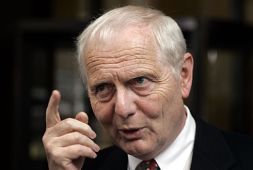UN envoys say keep pressure on Sudan over Darfur
June 26, 2007 (UNITED NATIONS) — Sudan has expressed its “total unconditional acceptance” of a hybrid international force for Darfur, but the world must keep up the pressure on Khartoum, Britain’s U.N. envoy said on Tuesday.

Sudan agreed on June 12 to a combined United Nations and African Union peacekeeping force of more than 20,000 troops and police, but many diplomats doubt Khartoum will keep its word.
“In all the questions put to them, both the foreign minister and the president implicitly confirmed total unconditional acceptance of the hybrid operation,” Jones Parry said.
The force’s aim is to stop the violence in Darfur, where international experts estimate 200,000 people have died and 2.5 million have been expelled from their homes in more than four years of strife. Sudan says 9,000 people have died.
Sudan has sent mixed signals about the hybrid force, saying it should be under the AU’s command and control rather than the United Nations’, and suggesting it should be mainly African.
U.S. Ambassador Zalmay Khalilzad said he understood Sudan’s preference for African forces, but had asked Sudanese officials if they accepted that “there will be no ban or limitation on the non-African participation.”
“The foreign minister and the president, they were very clear. So now we have to see what they do in reality,” he told reporters before the Security Council meeting.
Khalilzad said Sudan has a history of “dragging its feet” so it was vital to maintain both engagement and pressure.
The United States has been pushing for a new Security Council resolution imposing fresh sanctions on Sudan, something China has resisted.
“We’ll keep the option of additional sanctions available,” Khalilzad said. But he said the priority now was to pass a resolution authorizing the hybrid force and its financing. He said that resolution could be circulated this week or next.
Since a peace deal last year signed by only one of three negotiating rebel factions, the insurgents in Darfur have split into more than a dozen different movements.
Jones Parry said it was necessary to keep up the pressure on both Khartoum and the rebels. “The government of Sudan has only come to the present cooperation because of all the international pressure that’s been put up on it,” he said.
But Khartoum “quite rightly” chastised the international community for not putting pressure on rebels, he said.
“Bringing both sides to an accord within the shortest time scale is the best way of providing long term security and peace in Darfur,” Jones Parry said.
(Reuters)
